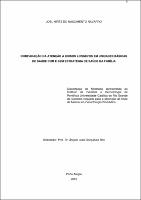| Share record |


|
Please use this identifier to cite or link to this item:
https://tede2.pucrs.br/tede2/handle/tede/6931| Document type: | Dissertação |
| Title: | Comparação da atenção a idosos longevos em unidades básicas de saúde com e sem estratégia de saúde da família |
| Other Titles: | Comparison of the oldest old care in primary care Units with and without the family health strategy |
| Author: | Navarro, Joel Hirtz do Nascimento  |
| Advisor: | Bós, Ângelo José Gonçalves |
| Abstract (native): | A Atenção Primária à Saúde (APS) constitui-se preferencialmente como o primeiro nível de contatode um indivíduo com o Sistema Único de Saúde e, a Estratégia de Saúde da Família (ESF) é o meio pelo qual busca-se a sua reorganização no Brasil. O Ministério da Saúde considera relevante a avaliação da APS através da presença e extensão dos atributos essenciais e derivados propostos pelo Instrumento de Avaliação da Atenção Primária (PCATool-Brasil). Nesse sentido, o presente estudo teve como objetivo comparar a atenção à saúde de longevos em Unidades Básicas de Saúde (UBS) com e sem ESF. Caracterizou-se por ser observacional, transversal e com abordagem quantitativa. Foram entrevistados 50 pessoas idosas com 80 anos ou mais, usuárias de UBS com e sem ESF do município de Porto Alegre, Rio Grande do Sul. Quando comparados os modelos de UBS apenas os serviços sem Saúde da Família demonstraram alto grau de orientação à APS para o Escore dos Atributos Essenciais e para o Escore Geral do PCATool-Brasil. Verificou-se que apesar de a ESF ser o meio pelo qual a APS reorganiza-se no País, esse modelo ainda não possui a efetividade planejada para a atenção à saúde das pessoas idosas. Entende-se que os achados deste estudo contribuem para que novas estratégias no processo de trabalho da APS sejam pensadas de forma que acolham com mais universalidade as pessoas idosas e suas diferentes capacidades, incluindo aquelas mais longevas. |
| Abstract (english): | The Primary Health Care (PHC) constitutes preferably as the first level of contact of an individual with the Unified Health System and the Family Health Strategy (FHS) is the means by which the reorganization is sought in Brazil. The Ministry of Health considers relevant to assessing the PHC through the presence and extent of the essential attributes and derivatives proposed by the Primary Care Assessment Tool (PCATool-Brazil). In this sense, the present study aimed to compare the health care of the oldest in Basic Health Units (BHU) with and without ESF. It characterized by being observational, cross-sectional and quantitative approach. Fifity elderly were interviewed, aged 80 or more, users of BHU with and without FHS in the city of Porto Alegre, Rio Grande do Sul. When comparing the BHU models only services without Family Health demonstrated a high degree of orientation to the PHC for the Essential Attributes Score and the General Score of PCATool-Brazil. It was found that although the FHS be the means by which the PHC reorganizes in the country, this model does not have the intended effectiveness for the health care of the elderly. It is understood that the findings of this study contribute to new strategies in the PHC work process is designed so that receive more universality the older people and their different capacities, including those longer-lived. |
| Keywords: | ATENÇÃO PRIMÁRIA À SAÚDE SAÚDE PÚBLICA IDOSOS GERIATRIA MEDICINA |
| CNPQ Knowledge Areas: | CIENCIAS DA SAUDE::MEDICINA |
| Language: | por |
| Country: | Brasil |
| Publisher: | Pontifícia Universidade Católica do Rio Grande do Sul |
| Institution Acronym: | PUCRS |
| Department: | Instituto de Geriatria e Gerontologia |
| Program: | Programa de Pós-Graduação em Gerontologia Biomédica |
| Access type: | Acesso Aberto |
| URI: | http://tede2.pucrs.br/tede2/handle/tede/6931 |
| Issue Date: | 23-Mar-2016 |
| Appears in Collections: | Programa de Pós-Graduação em Gerontologia Biomédica |
Files in This Item:
| File | Description | Size | Format | |
|---|---|---|---|---|
| DIS_JOEL_HIRTZ_DO_NASCIMENTO_NAVARRO_PARCIAL.pdf | Texto Parcial | 318.55 kB | Adobe PDF |  Download/Open Preview |
Items in DSpace are protected by copyright, with all rights reserved, unless otherwise indicated.




